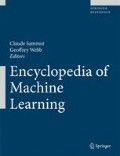Recommended Reading
Amit, A., & Markovitch, S. (2006). Learning to bid in bridge. Machine Learning, 63(3), 287–327.
Baxter, J., Tridgell, A., & Weaver, L. (2000). Learning to play chess using temporal differences. Machine Learning, 40(3), 243–263.
Billings, D., Peña, L., Schaeffer, J., & Szafron, D. (2002). The challenge of poker. Artificial Intelligence, 134(1–2), 201–240. Special issue on games, computers and artificial intelligence.
Björnsson, Y., & Marsland, T. A. (2003). Learning extension parameters in game-tree search. Information Sciences, 154(3–4), 95–118.
Bowling, M., Fürnkranz, J., Graepel, T., & Musick, R. (2006). Special issue on machine learning and games. Machine Learning, 63(3), 211–215.
Buro, M. (2002). Improving heuristic mini-max search by supervised learning. Artificial Intelligence, 134(1–2), 85–99. Special issue on games, computers and artificial intelligence.
Donninger, C., & Lorenz, U. (2006). Innovative opening-book handling. In H. J. van den Herik, S.-C. Hsu, & H. H. L. M. Donkers, (Eds.), Advances in computer games. Berlin: Springer.
Fürnkranz, J. (2001). Machine learning in games: A survey. In J. Fürnkranz & M. Kubat (Eds.), Machines that learn to play games (Chap. 2, pp. 11–59). Huntington, NY: Nova Science Publishers.
Fürnkranz, J., & Kubat, M. (Eds.). (2001). Machines that learn to play games. Huntington, NY: Nova Science Publishers.
Ghory, I. (2004). Reinforcement learning in board games. Technical Report CSTR-04-004. Department of Computer Science, University of Bristol, Bristol, UK. http://www.cs.bris.ac.uk/Publications/pub_info.jsp?id=2000100.
Herbrich, R., Minka, T., & Graepel, T. (2007). TrueskillTM: A bayesian skill rating system. In B. Schölkopf, J. C. Platt, & T. Hoffman (Eds.), Advances in neural information processing systems (NIPS-06) (Vol. 19, pp. 569–576). Vancouver, BC, Canada: MIT Press.
Laird, J. E., & van Lent, M. (2001). Human-level AI’s killler application: Interactive computer games. AI Magazine, 22(2), 15–26.
Michie, D. (1963). Experiments on the mechanization of game-learning – Part I. Characterization of the model and its parameters. The Computer Journal, 6, 232–236.
Ponsen, M., Muñoz-Avila, H., Spronck, P., & Aha, D. W. (2006). Automatically generating game tactics via evolutionary learning. AI Magazine, 27(3), 75–84.
Sadikov, A., & Bratko, I. (2006). Learning long-term chess strategies from databases. Machine Learning, 63(3), 329–340.
Schaeffer, J., Björnsson, Y., Burch, N., Lake, R., Lu, P., & Sutphen, S. (2003). Building the checkers 10-piece endgame databases. In H. J. van den Herik, H. Iida, & E. A. Heinz (Eds.), Advances in computer games (Vol. 10, pp. 193–210). Graz, Austria: Springer.
Schaeffer, J., Burch, N., Björnsson, Y., Kishimoto, A., Müller, M., Lake, R., Lu, P., Sutphen, S. (2007). Checkers is solved. Science 317(5844):1518–1522.
Schaeffer, J., & van den Herik, H. J. (Eds.) (2002). Chips challenging champions: Games, computers and artificial intelligence. Amsterdam: North-Holland. (Reprint of a special issue of Artificial Intelligence, 134(1–2)).
Southey, F., Xiao, G., Holte, R. C., Trommelen, M., & Buchanan, J. W. (2005). Semi-automated gameplay analysis by machine learning. In R. M. Young & J. E. Laird (Eds.), Proceedings of the 1st artificial intelligence and interactive digital entertainment conference (AIIDE-05) (pp. 123–128). AAAI Press: Marina del Rey, CA.
Spronck, P., Ponsen, M. J. V., Sprinkhuizen-Kuyper, I. G., & Postma, E. O. (2006). Adaptive game AI with dynamic scripting. Mach- ine Learning, 63 (3), 217–248.
Stern, D., Herbrich, R., & Graepel, T. (2006). Bayesian pattern ranking for move prediction in the game of Go. In Proceedings of the 23rd international conference on machine learning (ICML-06) (pp. 873–880). New York: ACM.
Author information
Authors and Affiliations
Editor information
Editors and Affiliations
Rights and permissions
Copyright information
© 2011 Springer Science+Business Media, LLC
About this entry
Cite this entry
Fürnkranz, J. (2011). Machine Learning and Game Playing. In: Sammut, C., Webb, G.I. (eds) Encyclopedia of Machine Learning. Springer, Boston, MA. https://doi.org/10.1007/978-0-387-30164-8_504
Download citation
DOI: https://doi.org/10.1007/978-0-387-30164-8_504
Publisher Name: Springer, Boston, MA
Print ISBN: 978-0-387-30768-8
Online ISBN: 978-0-387-30164-8
eBook Packages: Computer ScienceReference Module Computer Science and Engineering

